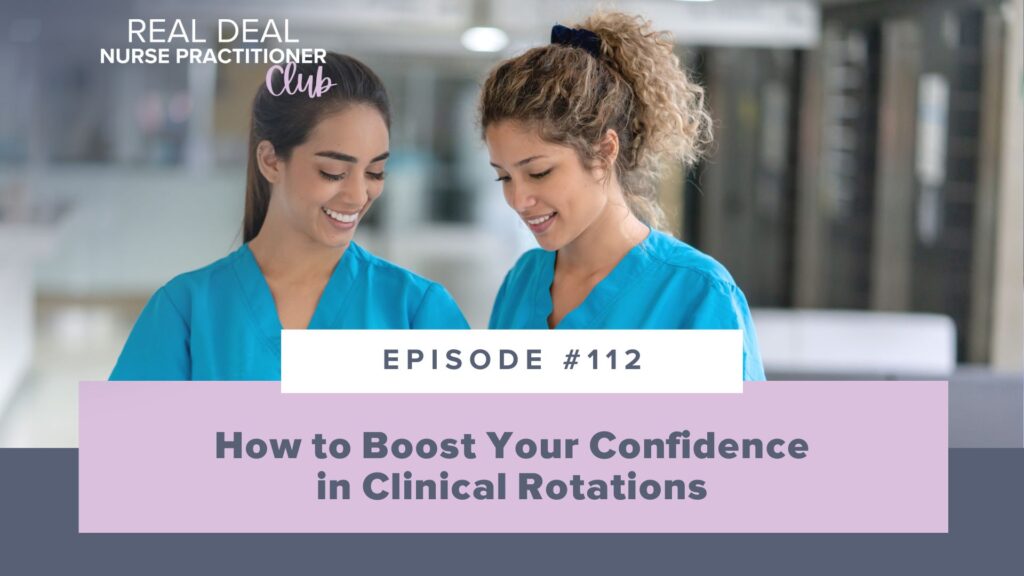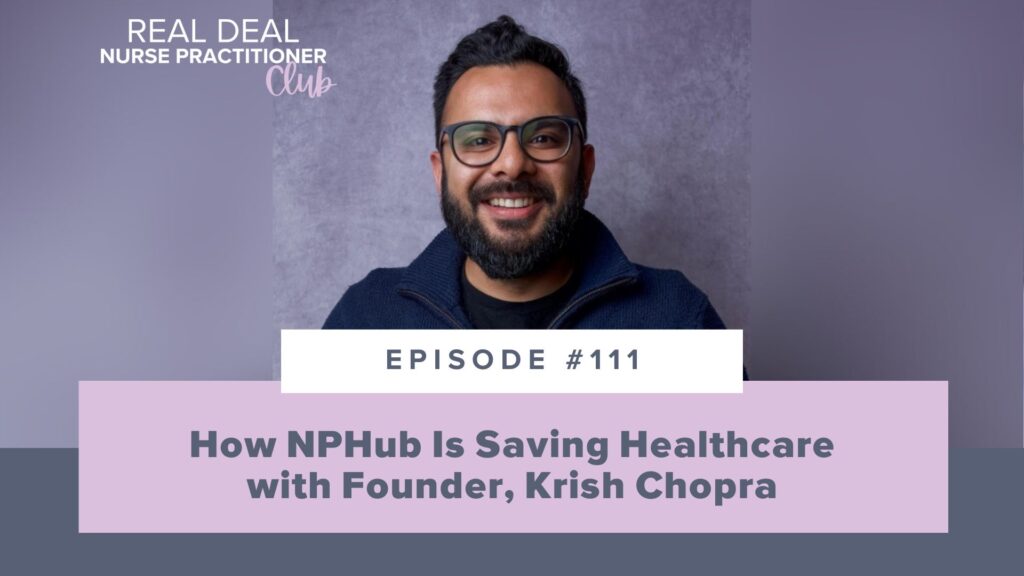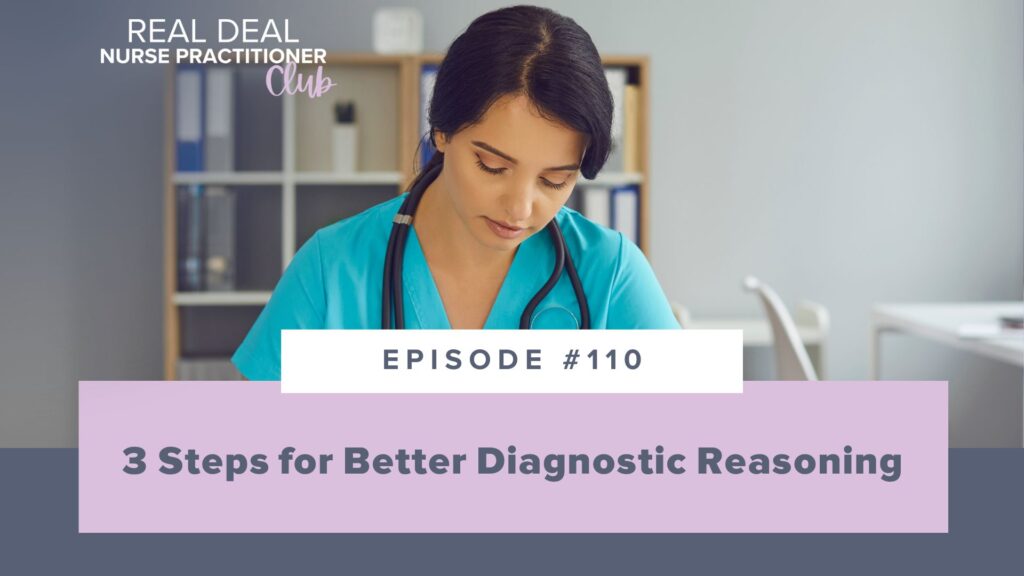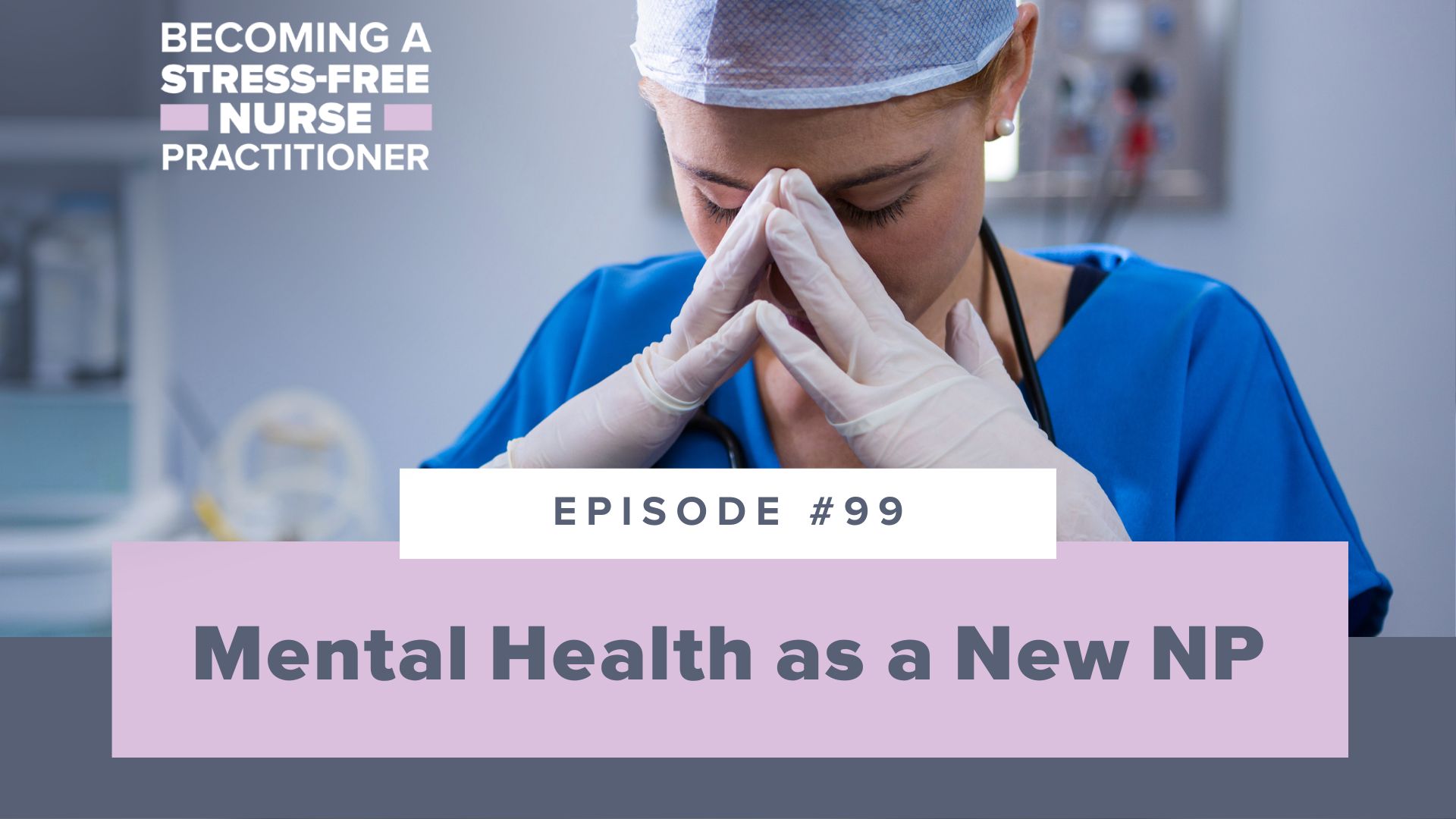
This week, Anna and I are here to discuss a topic that is near and dear to our hearts: mental health and self-care for Nurse Practitioners. If you’ve taken any of our classes, you’ll know that we focus on stress and anxiety management as you prepare for boards, but prioritizing your mental health is vital throughout your career as a healthcare provider.
From the demands of the job and emotional weight you carry, to the pressure to perform day in and day out, all of it takes a toll on your well-being. We rightly focus on the well-being of our patients in this profession, but it’s equally important to prioritize your own mental health to truly thrive as an NP.
Tune in today to discover why the role of Nurse Practitioner comes with unique challenges, and why addressing this topic is crucial for the sustainability of the NP profession as a whole. We’re clarifying what self-care really means, why it’s a necessary part of being an effective healthcare provider, and practical self-care strategies you can begin implementing now.
If you’re looking for support, no matter what phase of your nurse practitioner journey you’re currently in, I have communities available for both students and new nurse practitioners. In these communities, we work to uplift one another and grow this profession together every day, so click here to check them out!
What You Will Discover:
- The unique mental health challenges we face as Nurse Practitioners.
- How the demands of your job can take a toll on your mental health and overall well-being.
- Why self-care is a vital part of being an effective healthcare provider.
- Practical self-care strategies you can implement into your daily life.
Featured on the Show:
- If you’re looking for extra support, I have communities available for both students and new nurse practitioners. Click here if you’re a student, and click here if you’re a new NP!
- Follow me on: Facebook | Instagram | YouTube | TikTok
- Ep #1: Don’t Give Up: The Journey to Becoming a Stress-Free Nurse Practitioner
- Ep #37: Time Management Hacks with Diana Page
- Ep #77: Holiday Season Time-Saving Hacks for New Nurse Practitioners [NEW NP]
Full Episode Transcript:

Welcome to Becoming a Stress-Free Nurse Practitioner, a show for new NPs and students that want to pass their board exam the first time and make that transition from RN to NP as seamless as possible. I’m your host Sarah Michelle. Now, let’s dive into today’s episode.
Sarah: Hello, my beautiful friends, Sarah Michelle here. And today we are going to be talking about a topic on this podcast that really, I feel like it touches the heart of many nurse practitioners and nursing students, but especially my heart and I know Anna’s heart too. And that is mental health and self-care for nurse practitioners.
If you have taken any of our board prep classes you know that we stress anxiety management and self-care, but mental health throughout the career as a healthcare provider is going to be absolutely crucial. So in this profession we often, and rightfully so, focus on the wellbeing of our patients, but it’s equally important to prioritize our own mental health. The demands of the job, the emotional toll, the pressure to perform, we all know that so well, can definitely take a toll on our wellbeing.
And I know that self-care, mental health, all these things can kind of feel like buzz words after Covid and the pandemic, but definitely in this episode we want to touch on the meat of these and get to the heart of these, and so we’re going to be providing some strategies for self-care in a non buzzword form, talk about those retention rates of new nurse practitioners, especially in that first one to five years in the profession, and really just the unique mental health challenges that we face as nurse practitioners together.
Anna: Yeah, like you said, being a nurse practitioner or really any type of healthcare provider really, it comes with a very unique set of mental health challenges, I think. And one prevalent challenge that does not leave when you pass your boards is anxiety, because the responsibility of diagnosing and treating patients coupled with the extremely fast-paced nature of healthcare nowadays really leads to increased anxiety rates.
As a new nurse practitioner I found myself wondering all the time, “Am I making the right decisions? Did I miss something important?” That thought would wake me up at night. And just having these thoughts over and over again, really took a toll on my mental health and confidence. But anxiety is just one aspect.
And burnout is another because we have a very heavy workload, we usually work long hours. And again, like you said, that emotional demand of caring for patients, all of these can lead to burnout. And this is usually characterized if you start noticing both physical and just emotional exhaustion, because as nurse practitioners, as caregivers, also remember that compassion fatigue is a real thing. And that’s pretty closely related to burnout.
And compassion fatigue is that feeling of just pure emotional exhaustion that comes from constantly caring for others.
Sarah: Which is so easy to fall into, because I definitely did as an oncology nurse. I loved my job, I loved the patients I took care of. But the compassion fatigue and just the emotional exhaustion was really, really hard. Even though I loved what I did, it was still really hard.
And I think to just kind of put these challenges in perspective, let’s talk about some statistics for a second. So studies have shown that the retention rate for new nurse practitioners can be challenging, particularly in that first one to five years of practice. So, many nurse practitioners leave the profession altogether. So altogether they’re not nurse practitioners anymore during this period due to stress, burnout, mental health concerns.
And so recognizing and addressing these challenges is essential, not only for our personal wellbeing, but also just for the sustainability of the NP profession as a whole. And so we just have to think about how we can navigate this? And what is that self-care buzzword that everybody’s always talking about?
And I think when people think about self-care, they think about indulging in a spa day, which is great.
Anna: Yeah, really nice.
Sarah: Yeah, that’s great. But self-care at its core is fundamental for maintaining your mental health and so we have to understand self-care, even though it has the word self in it, it’s not selfish. It is a necessary and vital part of being an effective healthcare provider. And by taking care of ourselves, we can only better care for our patients. And it’s definitely not a one time thing, it is ongoing.
And we need to prioritize our physical, emotional and psychological well being. So it involves recognizing when you need a break, giving yourself the permission to take that break. And as nurse practitioners, we’re often driven by our dedication to our patient, but remember that taking care of yourself is taking care of your patients. So really, it’s a win/win situation.
And I can think of a couple of different examples. We were talking in the telemedicine episode about holding boundaries, that’s also self-care. There’s all of these little ways that are not getting pedicures or going to the spa all day that are self-care and maintaining mental health for you.
Anna: Yeah, holding boundaries, allowing myself to take breaks and saying no, and getting comfortable in that became so crucial to me and my mental health.
And let’s talk about some other just practical self-care strategies that you can incorporate into your daily life as a nurse practitioner, because as much as we all want to, we can not all go do a spa day every single week. So some of the strategies that we’re going to talk about, these are designed to help you manage your anxiety, prevent burnout and just really enhance your overall well being as you enter into practice.
So first, you need to consider time management. This is one of those, like one of the hardest things as a new nurse practitioner. And really think about that work/life balance. I mean, we have a whole podcast episode on how to save time and time saving hacks as a new NP, and we just mentioned boundaries, right?
It is so important to set boundaries, first, with your patients, right? But also just between work and your personal life. You need to schedule and allow time for relaxation, for hobbies, and really for spending quality time with your loved ones. What are some other strategies you use, Sarah?
Sarah: I always think too, just mindfulness and relaxation techniques can be really effective for managing anxiety as a whole. So I love things like deep breathing, meditation. I know there’s a lot of patients out there that love that progressive muscle relaxation and there are apps that you can use, free resources online, there’s an abundance of this stuff available, especially after the pandemic.
And then don’t forget too, activity and exercise is not only good for your physical health, but it’s a great stress reliever and great for your mental health because regular physical activity can boost your mood, reduce anxiety, and improve your overall health. So find an activity you enjoy, whether it’s yoga, jogging, walking, dancing, definitely in my house we have some dance parties to Taylor Swift.
And then I also want to stress the importance too to not underestimate the power of seeking professional support and therapy if and when you need it. So if anxiety or other mental health concerns are becoming overwhelming, reach out to a professional that knows how to manage and deal with this with you, because they can provide the guidance and tools to help you navigate.
And remember, Anna I said this earlier but I’m going to reiterate it, it’s okay to say no when you need to. Over committing, which is like my greatest sin, and taking on too much can lead to burnout very quickly. So prioritize your workload, delegate tasks when you need to and always say no when you need to, that is huge in self-care.
Anna: Yeah, and remember you are the only one who can say no for yourself. So you have to remember that, you have to advocate for yourself and you have to ask for what you need. It is really hard sometimes, but the more you do it, the more comfortable it becomes.
And I also want to add seeking support when facing mental health challenges, it is not a sign of weakness, it is a sign of strength. And we really need to foster a culture where seeking the support is encouraged and the stigma is reduced, both for us and our patients.
But I feel like sometimes, Sarah, there’s just this unspoken expectation that healthcare providers are immune to mental health challenges. And this misconception just prevents us from seeking the care we need.
Sarah: For sure. And this goes for patient care as well. Reducing that stigma around mental health begins with just true, open and honest conversations always. So for you as a student or clinician who’s struggling, share your experiences and your challenges with trusted colleagues and friends. And with patients, you know that active listening we learned in school? Be empathetic, be curious and by normalizing discussions about mental health, we can create a more supportive environment for all healthcare professionals as a whole.
And additionally too, there are so many resources available to nurse practitioners. Definitely see what your employer offers and if there are things such as an employee assistance program, because those types of programs can provide that confidential support and guidance for those of you who out there are facing mental health challenges. I know through our work, I have access to a mindfulness and meditation app and that alone has been so helpful.
But just remembering too that you’re never alone in this journey, even if it feels like you are. Many students and many nurse practitioners out there have faced similar challenges and have found ways to overcome them, especially that big transition into practice, like that is a true challenge. So seeking support, especially during a time like that is a sign of strength, resilience, and honestly too, self-awareness.
Anna: Yeah. And really, as we finish out here, I want to lean in on those open and honest conversations and just give us the opportunity to share some personal stories and insights because we are no strangers to mental health conditions. And remember, you’re not alone. And when we start these conversations and you start to realize you’re not alone, that alone makes me personally feel so much better.
One story, at least that comes to mind for me, is I remember this is actually when I was a nurse, not a nurse practitioner. And we had a really, really traumatic event happen when I was working in the labor and delivery unit. And that affected my mental health so much to the point where I was scared to go into the hospital every single shift.
And I remember just having to talk to different people who went through a similar experience, just sharing my side of the story. And all of that really helped. But that’s also one of those things that just requires, I think, some professional communication and therapy as well. And so it’s not something to be ashamed of if that’s something you experience as a nurse or nurse practitioner, or even something you’ve experienced in school.
Sarah: Yeah, the first thing that I always think of about mental health challenges and being a nurse is me almost being thrown out of nursing school, which I talked about on the very first episode of this podcast, and how it kind of sparked me to one day become an educator. But I think, more recently, for those who are more intimately familiar with my life, my daughter has a heart defect.
And so trying to navigate being a nurse practitioner and having the knowledge base and they’re walking in her room, like we were literally in the hospital at Christmas and they’re like, she has a brain bleed, and she has this and her chest is open. There was so much mental health stuff, and I have obsessive compulsive disorder to navigate. And so it really just adds up. And there’s no way, like literally no human way that I could have managed that all by myself. I literally have two therapists.
Anna: We love therapy.
Sarah: Yes, mental health is a lifelong thing. And sometimes you’ll be better, sometimes it’ll be worse. But figuring out where you’re at, the self-awareness is huge to identify when you do need that help because that’s the only way you’re going to be able to move forward, is by getting that help.
Anna: Yeah, and remember if you are struggling with anything, or you start to struggle with anything, you are not defined by having these challenges, rather just like our ability to overcome them. And I know that sounds a little cheesy but, like you said, it has its ups and downs, but you just need to find the right support. Have those buzzwords, self-care practices that we all kind of roll our eyes at. But when we do these and we’re able to share, we’re able to reduce the stigma, I mean, we can truly thrive as nurse practitioners. And that’s our goal, right?
Sarah: Absolutely. And mental health challenges that healthcare professionals face are real, but so are those strategies and support systems available to help us overcome them. And by prioritizing self-care, seeking support when needed, reducing that stigma associated with mental health, which I hope doing episodes like this empowers us to do, we can continue to provide high-quality care to both ourselves and our patients.
And I’ve said this before and I’ll say it again, you’re not alone in this journey, remember that one last time. And we’re here to support each other and together we can really build a more resilient and mentally healthy nurse practitioner community, which if that’s what comes out of me creating this business, like that’s the dream goal to me.
Anna: Absolute dream.
Sarah: And that’s it for this week. We’ll talk to you guys next week.
As an extra bonus, friends, if you’re looking for support no matter what phase of your nurse practitioner journey you’re currently in, I have communities available for both students and new nurse practitioners. In these communities, we work to uplift one another and grow this profession together every single day. Links to join will be included for you in the show notes.
Thanks for listening to Becoming a Stress-Free Nurse Practitioner. If you want more information about the different types of support we offer to students and new NPs, visit https://www.npreviews.com/resources. See you next week.
Enjoy the Show?
- Don’t miss an episode: follow the podcast on Spotify, Apple Podcasts, Google Podcasts, or RSS.
- Leave a review in Apple Podcasts.
Search the Blog
Join our Facebook Group!
Get FREE support and encouragement from thousands of NP students and our NP Support team.
Learn More3 Study Hacks to Conquer Your NP Exam!
Download these tips that have helped thousands of students pass their NP board exams.
Download NowInstitutional Partnerships
Are you a faculty member and would like to bring Sarah Michelle’s resources to your school? Email us at nursinggroups@blueprintprep.com for special institutional pricing or click on the link below to learn more.
Learn MoreGroup Discounts
Are you a student and have 10 or more classmates interested in purchasing Sarah Michelle’s courses? Email us at nursinggroups@blueprintprep.com for special pricing.
